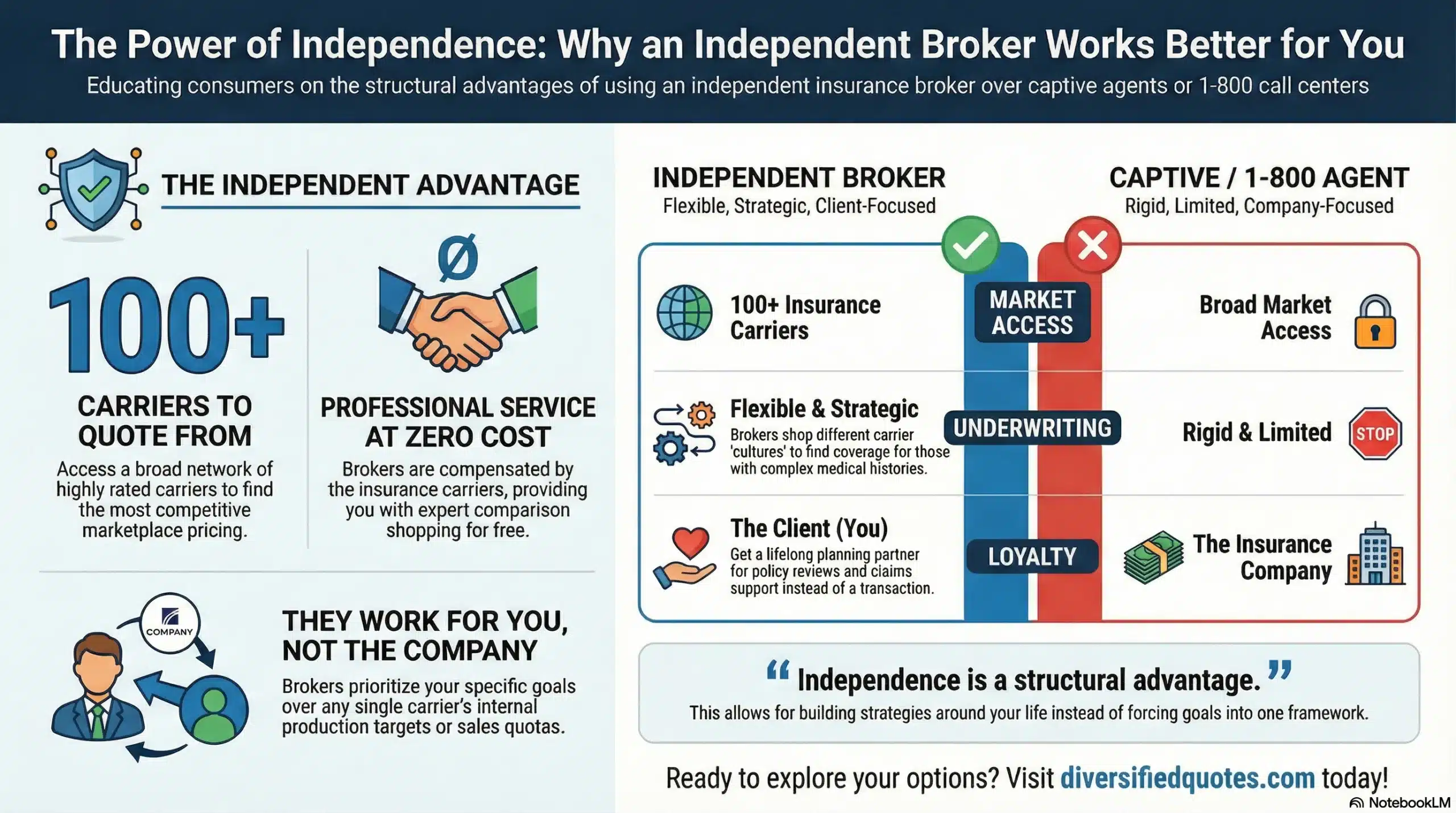Whole Life Insurance with Cash Value Growth

Jason Stolz CLTC, CRPC
Whole life insurance with cash value growth is more than permanent life insurance — it is a disciplined financial strategy designed to protect your family while building long-term, tax-advantaged capital. Unlike term life insurance, which expires after a set number of years, whole life coverage remains in force for your entire lifetime, provided premiums are paid. At the same time, it builds guaranteed cash value that compounds steadily year after year.
For families seeking stability, business owners planning legacy strategies, or individuals looking for conservative asset accumulation outside of market volatility, whole life insurance offers predictability, guarantees, and liquidity that few financial products can replicate.
At Diversified Insurance Brokers, we design customized whole life strategies that integrate protection, tax efficiency, estate planning, and long-term savings into one coordinated plan.
Request a Whole Life Insurance Strategy Review
See how guaranteed cash value growth can protect your family and create long-term financial stability.
Get Your Personalized Whole Life QuoteWhat Makes Whole Life Insurance Different?
Whole life insurance is structured around three core pillars: guaranteed lifetime coverage, fixed premiums, and guaranteed cash value growth. Unlike investments tied to stock or bond markets, whole life policies grow based on contractual guarantees. This makes them especially attractive during periods of economic uncertainty or market volatility.
Each premium payment is allocated toward the cost of insurance and the policy’s cash value account. Over time, the cash value increases through guaranteed interest and, if issued by a participating mutual insurer, potential dividends. These dividends can be used to purchase paid-up additions, increasing both the cash value and the death benefit.
For policyholders seeking stability and predictability, this structure creates a financial foundation that is not dependent on market swings.
The Power of Guaranteed Compounding
In the early years of a whole life policy, growth may appear gradual because costs are front-loaded. However, as the policy matures, compounding accelerates. Over decades, this steady accumulation can produce significant liquidity.
Unlike taxable brokerage accounts, the growth inside a whole life policy accumulates tax-deferred. When structured properly, policy loans can provide access to cash value without triggering taxable events.
For clients who prioritize conservative wealth building alongside lifetime protection, whole life insurance can function as a foundational asset class.
Strategic Uses for Cash Value
One of the most powerful features of whole life insurance is flexibility. Once sufficient cash value accumulates, policyholders can:
- Borrow against the policy for business expansion
- Supplement retirement income through tax-advantaged loans
- Cover emergency expenses without traditional loan underwriting
- Fund college tuition
- Create estate liquidity to pay taxes or equalize inheritances
- Offset premiums later in life using dividends
Because loans are secured by the policy itself, approval is straightforward. However, strategic management is essential to preserve long-term sustainability.
Build Wealth While You Protect Your Family
Explore whole life strategies tailored to your age, health, and financial goals.
Start Your Strategy ConsultationWhole Life vs Term Life: Long-Term Strategy Comparison
Term life insurance serves a critical purpose — temporary income protection. It is cost-effective and ideal for covering mortgages, raising children, or replacing income during peak earning years.
However, term policies do not build equity. Once the term ends, coverage expires unless renewed at substantially higher rates.
Whole life insurance, by contrast, builds guaranteed equity. For many families, combining both strategies provides balance: term coverage for short-term needs and whole life for permanent wealth accumulation and legacy planning.
Who Benefits Most from Whole Life Insurance?
Whole life insurance is particularly beneficial for:
- High-income earners seeking tax-advantaged diversification
- Business owners funding buy-sell agreements or key person strategies (see Benefits of Key Person Insurance)
- Families planning long-term estate transfer
- Parents building intergenerational wealth (see Life Insurance for New Parents)
- Individuals seeking coverage without a Social Security number (see Life Insurance Without a Social Security Number)
- Individuals rebuilding financial stability after divorce (see Life Insurance for Divorcees)
- Military families and special operations professionals (see Life Insurance for Special Forces)
Whole Life and Retirement Income Planning
When structured correctly, whole life insurance can supplement retirement income. Unlike qualified retirement accounts subject to required minimum distributions, whole life policies do not impose mandatory withdrawal schedules.
Policy loans may provide tax-efficient income streams in retirement, allowing clients to manage tax brackets strategically. This can be particularly beneficial when coordinating with Social Security, pensions, and other taxable income sources.
Using Whole Life for Business Planning
Business owners often use whole life policies to fund buy-sell agreements, provide key person protection, or create executive benefit packages. In these cases, the guaranteed cash value becomes a corporate asset, while the death benefit ensures business continuity.
When paired with disability planning (see Disability Insurance for High Earners and Business Owners) or specialized coverage like Accident Only Disability Income Insurance, it creates a comprehensive risk management strategy.
Dividend-Paying Whole Life Policies
Participating whole life policies issued by mutual insurers may pay dividends based on company performance. While not guaranteed, many top-rated mutual carriers have paid dividends consistently for decades.
Dividends can be used to:
- Purchase paid-up additions
- Reduce premiums
- Accumulate interest
- Receive as cash
Paid-up additions are especially powerful because they increase both death benefit and cash value, accelerating long-term growth.
Tax Advantages of Whole Life Insurance
Whole life policies offer multiple tax advantages:
- Tax-deferred cash value growth
- Income tax-free death benefit (generally)
- Potential tax-free policy loans
- No annual contribution limits (subject to MEC rules)
For high earners who have maximized 401(k)s and IRAs, whole life insurance can provide additional conservative accumulation capacity.
Estate and Legacy Planning
For families with estate tax concerns, whole life insurance provides liquidity to cover estate taxes, equalize inheritances among heirs, or fund charitable legacies.
Because the death benefit is generally income tax-free to beneficiaries, it provides efficient wealth transfer.
Long-Term Stability in Uncertain Markets
Market volatility can erode investor confidence. Whole life insurance offers contractual guarantees that are not dependent on stock market returns.
This stability makes it particularly attractive during economic downturns when conservative capital preservation becomes a priority.
Secure Lifetime Protection and Guaranteed Growth
Speak with a licensed advisor to design a whole life policy aligned with your long-term financial goals.
Request Your Personalized IllustrationWhy Choose Diversified Insurance Brokers?
Since 1980, Diversified Insurance Brokers has helped families compare policies from over 75 A-rated carriers. We provide detailed illustrations showing guaranteed and non-guaranteed values, internal rate of return projections, dividend histories, and long-term sustainability modeling.
Our approach focuses on education, transparency, and long-term strategy — not product sales. We help you determine whether whole life insurance fits your broader financial picture.
Related Pages
Explore additional insurance and financial planning resources that complement your whole life and long-term protection strategy:

Talk With an Advisor Today
Choose how you’d like to connect—call or message us, then book a time that works for you.
Schedule here:
calendly.com/jason-dibcompanies/diversified-quotes
Licensed in all 50 states • Fiduciary, family-owned since 1980
FAQs: Whole Life Insurance with Cash Value Growth
How does cash value growth work in a whole life policy?
A portion of each premium is set aside into a cash-value account. Over time this cash value grows through guaranteed interest, possibly dividends (if it’s a participating policy), and compounding.
Are dividends guaranteed?
No. Dividends depend on insurer performance, but many top-rated mutual insurers have paid them consistently for decades.
Can I access my cash value?
Yes. You may borrow against or withdraw from cash value, subject to policy rules.
Is whole life insurance good for retirement?
It can supplement retirement income through policy loans and tax-deferred growth.
What happens to the cash value at death?
The beneficiary typically receives the death benefit, not the separate cash value amount.
About the Author:
Jason Stolz, CLTC, CRPC and Chief Underwriter at Diversified Insurance Brokers, is a senior insurance and retirement professional with more than two decades of real-world experience helping individuals, families, and business owners protect their income, assets, and long-term financial stability. As a long-time partner of the nationally licensed independent agency Diversified Insurance Brokers, Jason provides trusted guidance across multiple specialties—including fixed and indexed annuities, long-term care planning, personal and business disability insurance, life insurance solutions, and short-term health coverage. Diversified Insurance Brokers maintains active contracts with over 100 highly rated insurance carriers, ensuring clients have access to a broad and competitive marketplace.
His practical, education-first approach has earned recognition in publications such as VoyageATL, highlighting his commitment to financial clarity and client-focused planning. Drawing on deep product knowledge and years of hands-on field experience, Jason helps clients evaluate carriers, compare strategies, and build retirement and protection plans that are both secure and cost-efficient.
